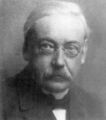Template:Selected anniversaries/August 17: Difference between revisions
No edit summary |
No edit summary |
||
| Line 56: | Line 56: | ||
||1958: Pioneer 0, America's first attempt at lunar orbit, is launched using the first Thor-Able rocket and fails. Notable as one of the first attempted launches beyond Earth orbit by any country. | ||1958: Pioneer 0, America's first attempt at lunar orbit, is launched using the first Thor-Able rocket and fails. Notable as one of the first attempted launches beyond Earth orbit by any country. | ||
||1969: Otto Stern dies ... | ||1969: Otto Stern dies ... scientist and winner of the Nobel Prize for Physics in 1943 for his development of the molecular beam as a tool for studying the characteristics of molecules and for his measurement of the magnetic moment of the proton. Pic. | ||
|File:Skip Digits.jpg|link=Skip Digits|1969: During a command performance at the White House, musician and alleged math criminal [[Skip Digits]] gives the first public demonstration of the [[math virus]] which will later be known as the [[Watergate Scandal (virus)|Watergate Scandal virus]]. | |File:Skip Digits.jpg|link=Skip Digits|1969: During a command performance at the White House, musician and alleged math criminal [[Skip Digits]] gives the first public demonstration of the [[math virus]] which will later be known as the [[Watergate Scandal (virus)|Watergate Scandal virus]]. | ||
| Line 71: | Line 71: | ||
File:Lorenz_attractor_trajectory-through-phase-space.gif|link=Lorenz system (nonfiction)|1996: [[Lorenz system (nonfiction)|Lorenz system]] develops self-awareness, spontaneous seeks out and fights [[crimes against mathematical constants]]. | File:Lorenz_attractor_trajectory-through-phase-space.gif|link=Lorenz system (nonfiction)|1996: [[Lorenz system (nonfiction)|Lorenz system]] develops self-awareness, spontaneous seeks out and fights [[crimes against mathematical constants]]. | ||
||2000: Robert Rowe Gilruth dies ... aerospace scientist, engineer, and a pioneer of the Mercury, Gemini, and Apollo space programs. He developed the X-1, first plane to break the sound barrier. Gilruth directed Project Mercury, the initial program for achieving manned space flight. Under his leadership, the first American astronaut orbited the Earth only a little over 3 years after NASA was created. In 1961, President Kennedy and the Congress committed the nation to a manned lunar landing within the decade. Gilruth was named the Director of the Manned Spacecraft Center and assigned the responsibility of designing and developing the spacecraft and associated equipment, planning and controlling missions, and training flight crews. He retired from NASA in 1973. Pic. | |||
||2004: Shizuo Kakutani dies ... mathematician, best known for his eponymous fixed-point theorem. Pic. | ||2004: Shizuo Kakutani dies ... mathematician, best known for his eponymous fixed-point theorem. Pic. | ||
| Line 79: | Line 81: | ||
||2008: Andrew Mattei Gleason dies ... mathematician who as a young World War II naval officer broke German and Japanese military codes, then over the succeeding sixty years made fundamental contributions to widely varied areas of mathematics, including the solution of Hilbert's fifth problem, and was a leader in reform and innovation in mathematics teaching at all levels. Pic. | ||2008: Andrew Mattei Gleason dies ... mathematician who as a young World War II naval officer broke German and Japanese military codes, then over the succeeding sixty years made fundamental contributions to widely varied areas of mathematics, including the solution of Hilbert's fifth problem, and was a leader in reform and innovation in mathematics teaching at all levels. Pic. | ||
||2011: William K. Estes born ... psychologist who was a leader in bringing mathematical methods into psychological research. In 1977, he was awarded the National Medal of Science for “his fundamental theories of cognition and learning that transformed the field of experimental psychology. His pioneering methods of quantitative modeling and an insistence on rigor and precision established the standard for modern psychological science.” In his early professional research he partnered with another pioneering psychologist B. F. Skinner in studying animal learning and behavior. The quantitative method they devised to measure emotional reactions is still widely used today. From 1979, Estes focused on investigating human memory and classification learning. Pic: https://www.todayinsci.com/8/8_17.htm | |||
||2016: Katharine Blodgett Gebbie dies ... astrophysicist and civil servant. | ||2016: Katharine Blodgett Gebbie dies ... astrophysicist and civil servant. | ||
Revision as of 09:58, 15 August 2018
1807: Robert Fulton's North River Steamboat leaves New York City for Albany, New York, on the Hudson River, inaugurating the first commercial steamboat service in the world.
1904: Physicist, chemist, and crime-fighter Marie Curie condemns Extract of Radium as "a terrible hazard to health and sanity."
1927: Mathematician Erik Ivar Fredholm dies. He introduced and analyzed a class of integral equations now called Fredholm equations. Fredholm's work on integral equations and operator theory anticipated the theory of Hilbert spaces.
1929: Captain and pilot Francis Gary Powers born.
1930: Film director and arms dealer Egon Rhodomunde begins shooting his film Spy Pilot.
1970: Soviet spacecraft Venera 7 launched from Earth. It will become the first successful soft landing on another planet (Venus).
1996: Lorenz system develops self-awareness, spontaneous seeks out and fights crimes against mathematical constants.






